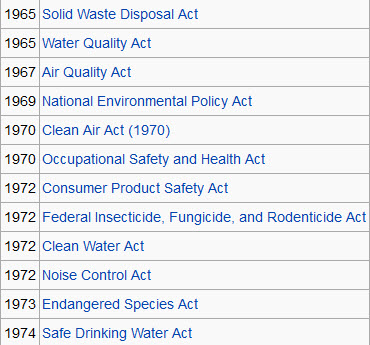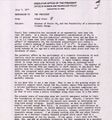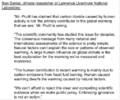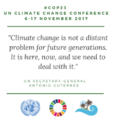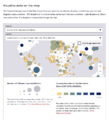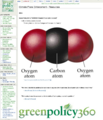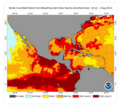Category:Environmental Laws: Difference between revisions
Siterunner (talk | contribs) No edit summary |
Siterunner (talk | contribs) No edit summary |
||
| Line 2: | Line 2: | ||
<big>'''''United States'''''</big> | <big>'''''United States'''''</big> | ||
(''Updated: | (''Updated: 2016'') | ||
[http://www.greenpolicy360.net/w/Earth_and_Space,_Politics '''''Earth and Space, Politics'''''] | [http://www.greenpolicy360.net/w/Earth_and_Space,_Politics '''''Earth and Space, Politics'''''] | ||
| Line 47: | Line 47: | ||
'''''See Also''''': | '''''See Also''''': | ||
(SJS: The legal provisions and politics of many trade agreements act to undercut and 'water down' environmental laws. The on-the-ground reality of many provisions within existing trade agreements that act against environmental law protections remain one of the foremost challenges for greens and the environmental movement. One necessity among many is to point out the problems with secret administrative rulings of trade treaties, the "ISDS" sections in the treaties, and reform/rewrite these sections to enable worker/environmental protections across economic systems and national borders. This is a "blue-green", labor-environment alliance, that needs to be continually developed for steady progress, locally and globally.) | |||
General Agreement on Tariffs - https://en.wikipedia.org/wiki/General_Agreement_on_Tariffs_and_Trade | |||
International Centre for Settlement of Investment Disputes - https://en.m.wikipedia.org/wiki/International_Centre_for_Settlement_of_Investment_Disputes | International Centre for Settlement of Investment Disputes - https://en.m.wikipedia.org/wiki/International_Centre_for_Settlement_of_Investment_Disputes | ||
| Line 62: | Line 66: | ||
_____________________________________________________ | _____________________________________________________ | ||
Siterunner / SJS: Reflecting about the 1992 US presidential campaign when I served in a number of roles as a Sr advisor to Jerry Brown. | |||
One memory comes into view as the subject of environmental laws is discussed here at GreenPolicy. This is the NAFTA controversy, the treaty that was being debated between our campaign and the Clinton campaign. We opposed the treaty as it was negotiated, the Clinton campaign and much of the 'new' Democratic party as reflected in the Democratic Leadership Council (DLC) supported it. | |||
In the presidential debates at one point I was preparing briefing materials for Governor Brown and what we were focusing on was what we called the 'watering down' of worker and environmental law protections that had been so hard won over the years in the US. What we were saying is that, with the passage of these treaties as written, there would be 'a race to the bottom' and with trade treaties like NAFTA and GATT were costly in many ways that would set back progress on multiple fronts, from jobs to environmental protection and security. Why? Because of provisions that allowed 'secret tribunals' to arbitrate and decide on disputes over 'non-tariff trade barriers', i.e, worker and environmental protection laws. | |||
The history of the 1992 campaign also illustrated how the Perot campaign (which eventually received 19% of the general election vote and was instrumental in the election of Bill Clinton, who received 43% of the vote) took up the Brown campaign motto and themes, including opposition to the NAFTA, agreement but did not focus in on the extra-admistrative authority contained in Investor-state dispute mechanisms and so-called non-tariff trade barriers. | |||
The recent action by a Canadian corporation to sue the US for $15 billion in 'damages' over the US rejection of the XL gas pipeline based upon study and evidence of environmental and climate damage, is just one example of multiple instances where the tribunal's actions are a front- and back-end threat to progress on worker/environmental law that benefits the commons and, in the case of climate policy, is essential for global and national security. | |||
Revision as of 16:51, 1 July 2016
United States
(Updated: 2016)
The recent U.S. elections have produced a 'turn-back-the-clock caucus' in the US Congress. The resulting efforts to roll back environmental laws passed with success over the yrs will present a challenge to profound green progress. We should consider again the beginning of the green era in the U.S. and successive accomplishments in law and practice that clearly deserve to be built upon, not to be dismantled by retro-policies.
_____________________________________________________
Global/International
List of International Environmental Agreements
○
Montreal Protocol - https://en.wikipedia.org/wiki/Montreal_Protocol - Due to its widespread adoption and implementation it has been hailed as an example of exceptional international co-operation, with Kofi Annan quoted as saying that "perhaps the single most successful international agreement to date has been the Montreal Protocol" ... When comparing this very success story with attempts to establish an international policy on the Earth's climate or atomic energy, the entire process from a problem formulation to a global acceptance supported by a legal framework took less than a quarter of a single human generation live span.
Among the treaty's accomplishments are: The Montreal Protocol was the first international treaty to address a global environmental regulatory challenge; the first to embrace the "precautionary principle" in its design for science-based policymaking; the first treaty where independent experts on atmospheric science, environmental impacts, chemical technology, and economics, reported directly to Parties, without edit or censorship, functioning under norms of professionalism, peer review, and respect; the first to provide for national differences in responsibility and financial capacity to respond by establishing a multilateral fund for technology transfer; the first MEA with stringent reporting, trade, and binding chemical phase-out obligations for both developed and developing countries; and, the first treaty with a financial mechanism managed democratically by an Executive Board with equal representation by developed and developing countries.
○
List of Environmental Law Suits
○
Note: https://en.m.wikipedia.org/wiki/Investor-state_dispute_settlement Investor-State Dispute Settlement / ISDS]
Investor-state dispute settlement (ISDS) is an instrument of public international law, that grants an investor the right to use dispute settlement proceedings against a foreign government. Provisions for ISDS are contained in a number of bilateral investment treaties, in certain international trade treaties, such as the North American Free Trade Agreement (Chapter 11) and the Trans-Pacific Partnership (Chapters 9 and 28). ISDS is also found in international investment agreements, such as the Energy Charter Treaty. If an investor from one country (the "Home State") invests in another country (the "Host State"), both of which have agreed to ISDS, and the Host State violates the rights granted to the investor under public international law, then that investor may bring the matter before an arbitral tribunal. So, for example, if after an investor has acquired the right to sell cigarettes in a Host State, the Home State imposes a heavy tax on cigarettes (because they are carcinogenic), then the investor sue for his losses: This is a great protection for corporate investment, and a recognition of the primacy of corporate profits.
"If you wanted to convince the public that international trade agreements are a way to let multinational companies get rich at the expense of ordinary people, this is what you would do: give foreign firms a special right to apply to a secretive tribunal of highly paid corporate lawyers for compensation whenever a government passes a law to, say, discourage smoking, protect the environment or prevent a nuclear catastrophe. Yet that is precisely what thousands of trade and investment treaties over the past half century have done, through a process known as 'investor-state dispute settlement', or ISDS."
— Via The Economist, October 2014
Note: In early January 2016, the TransCanada corporation announced it would initiate an ISDS claim under NAFTA against the United States, seeking $15 billion in damages and calling the denial of a permit for Keystone XL "arbitrary and unjustified."
January 2016 / News Via The Globe and Mail
See Also:
(SJS: The legal provisions and politics of many trade agreements act to undercut and 'water down' environmental laws. The on-the-ground reality of many provisions within existing trade agreements that act against environmental law protections remain one of the foremost challenges for greens and the environmental movement. One necessity among many is to point out the problems with secret administrative rulings of trade treaties, the "ISDS" sections in the treaties, and reform/rewrite these sections to enable worker/environmental protections across economic systems and national borders. This is a "blue-green", labor-environment alliance, that needs to be continually developed for steady progress, locally and globally.)
General Agreement on Tariffs - https://en.wikipedia.org/wiki/General_Agreement_on_Tariffs_and_Trade
International Centre for Settlement of Investment Disputes - https://en.m.wikipedia.org/wiki/International_Centre_for_Settlement_of_Investment_Disputes
International Investment Agreement - https://en.m.wikipedia.org/wiki/International_investment_agreement
North American Free Trade Agreement (NAFTA) - https://en.m.wikipedia.org/wiki/North_American_Free_Trade_Agreement
Tran-Pacific Partnership (TPP) - https://en.m.wikipedia.org/wiki/International_investment_agreement
Transatlantic Trade and Investment Partnership (TTIP) - https://en.m.wikipedia.org/wiki/Transatlantic_Trade_and_Investment_Partnership
United Nations Commission on International Trade Law - https://en.m.wikipedia.org/wiki/United_Nations_Commission_on_International_Trade_Law
_____________________________________________________
Siterunner / SJS: Reflecting about the 1992 US presidential campaign when I served in a number of roles as a Sr advisor to Jerry Brown.
One memory comes into view as the subject of environmental laws is discussed here at GreenPolicy. This is the NAFTA controversy, the treaty that was being debated between our campaign and the Clinton campaign. We opposed the treaty as it was negotiated, the Clinton campaign and much of the 'new' Democratic party as reflected in the Democratic Leadership Council (DLC) supported it.
In the presidential debates at one point I was preparing briefing materials for Governor Brown and what we were focusing on was what we called the 'watering down' of worker and environmental law protections that had been so hard won over the years in the US. What we were saying is that, with the passage of these treaties as written, there would be 'a race to the bottom' and with trade treaties like NAFTA and GATT were costly in many ways that would set back progress on multiple fronts, from jobs to environmental protection and security. Why? Because of provisions that allowed 'secret tribunals' to arbitrate and decide on disputes over 'non-tariff trade barriers', i.e, worker and environmental protection laws.
The history of the 1992 campaign also illustrated how the Perot campaign (which eventually received 19% of the general election vote and was instrumental in the election of Bill Clinton, who received 43% of the vote) took up the Brown campaign motto and themes, including opposition to the NAFTA, agreement but did not focus in on the extra-admistrative authority contained in Investor-state dispute mechanisms and so-called non-tariff trade barriers.
The recent action by a Canadian corporation to sue the US for $15 billion in 'damages' over the US rejection of the XL gas pipeline based upon study and evidence of environmental and climate damage, is just one example of multiple instances where the tribunal's actions are a front- and back-end threat to progress on worker/environmental law that benefits the commons and, in the case of climate policy, is essential for global and national security.
Subcategories
This category has the following 32 subcategories, out of 32 total.
Pages in category "Environmental Laws"
The following 96 pages are in this category, out of 96 total.
B
C
- California Global Warming Solutions Act
- Campaign Finance System Reform
- Carbon Brief
- Climate Change - Global Warming Keyword-Terms
- Climate Change Denier Talking Points -- and Rebuttals
- Climate Desk
- Climate Law Blog @Columbia Law School
- Climate migration
- Climate News
- Climate News Events Archive ... 1970 to Today
- Climate Plans Enforcement - Resources
- Climate Problems, Climate Solutions
- Convention on the International Trade in Endangered Species of Wild Flora and Fauna
E
- Each of us can make a positive difference
- Earth and Space, Politics
- Earth Day 2020
- Earth Day Memories on the 50th Anniversary
- Earth Day Summit - April 22 2021
- EarthTime
- Eco-economic Decoupling
- Eco-nomics
- Election System Reform
- Environmental agreements
- Environmental movement
- Environmental protection
- Environmental Protection Agency
- Environmental Rules Rolled Back
- Environmental Studies Online
- EOS eco Operating System
- ESA Living Planet Announcement - May 2022
- Ethics and Climate Change
- European Union Green Deal - Fit for 55
- ExxonMobil and US House Science Committee v US Attorneys General and Environmental Groups
G
- Generation Green
- George E. Brown Jr
- Glasgow Climate Summit - Pledges, Promises, Declarations - What's Next Up
- Global Climate Action Summit
- Going Green: Texas v. Pennsylvania
- Google Earth
- Google Earth Timelapse
- Governor Jerry Brown
- Green Bank in Maryland - and More
- Green Best Practices
- Green Party
- Green Stories of the Day
- Green Stories of the Day - GreenPolicy360 Archive
- GreenLinks
- GreenPolicy360 Archive Highlights 2013
- GreenPolicy360 Archive Highlights 2014
- GreenPolicy360 Archive Highlights 2015
- GreenPolicy360 Archive Highlights 2016
- GreenPolicy360 Archive Highlights 2017
- GreenPolicy360 Archive Highlights 2018
- GreenPolicy360 Archive Highlights 2019
- GreenPolicy360 Archive Highlights 2020
- GreenPolicy360 Archive Highlights 2023
- GreenPolicy360 Highlights
- GTN GreenLinks Trending News
O
P
R
Media in category "Environmental Laws"
The following 200 files are in this category, out of 691 total.
(previous page) (next page)- 1977 from the Office of Science and Technology Policy.jpg 661 × 711; 177 KB
- 2020 record temperatures.png 800 × 502; 358 KB
- 7-20-2020 GreenPolicy360 RT No.2.jpg 591 × 510; 125 KB
- A Flash of Green by John D. MacDonald.jpg 400 × 400; 55 KB
- A Planet Citizen View.png 799 × 1,241; 1.64 MB
- A scorching year, what about the 360 warming data.jpg 600 × 706; 106 KB
- A View of the Earth and Moon from Mars.jpg 720 × 890; 3 KB
- About Baselines and Change.png 592 × 312; 33 KB
- Acceptance on behalf of the United States of America.png 448 × 306; 62 KB
- Act now for a livable future.png 501 × 275; 272 KB
- Ag production and GHG emissions.jpg 680 × 510; 33 KB
- Air pollution moves globally.png 620 × 412; 256 KB
- Alaska Willow - March 12 2023.png 576 × 230; 99 KB
- Alaska Willow News-March 12 2023.png 576 × 625; 235 KB
- Amazon fires burn across the rainforest.jpg 800 × 504; 76 KB
- American Legislative Exchange Council.jpg 646 × 143; 41 KB
- Andrew Wheeler confirmed to head EPA.jpg 753 × 600; 85 KB
- Another year, another record.png 800 × 294; 251 KB
- Anti science, anti open data - EPA April 2017.png 429 × 616; 198 KB
- AOC re climate task force - july 8 2020.jpg 585 × 203; 38 KB
- Arctic - Kolbert - 2023.png 553 × 476; 274 KB
- Arctic 30.1 C at 62.5 N.jpg 800 × 432; 80 KB
- Arctic drilling ban Dec 21, 2016.png 692 × 536; 119 KB
- Arctic heat in Russia-Siberia 2020.gif 784 × 408; 3.6 MB
- Arctic Melt - 1950-2020.png 640 × 349; 287 KB
- Arctic Sea Ice Area graphic thru 2016.png 640 × 355; 382 KB
- Arctic Siberia Heatwave - Again - June 2021.jpg 640 × 360; 83 KB
- Arctic-March30,2019.jpg 797 × 600; 126 KB
- Arctic-swipa-spm.pdf ; 4.58 MB
- Astro POV - Mike Massimino - PlanetCitizen.png 800 × 466; 792 KB
- Astro Samantha.png 448 × 266; 78 KB
- Atmosphere Science.jpg 800 × 600; 45 KB
- Atmospheric Experiment of Humanity.jpg 519 × 574; 201 KB
- AU Too Hot.png 640 × 413; 286 KB
- Banking - finance - climate - Mann-1.jpg 452 × 640; 162 KB
- Banking - finance - climate - Mann-2.jpg 452 × 640; 164 KB
- Battle for Democracy.jpg 640 × 123; 24 KB
- Be a planet citizen, make a choice, act to reduce climate change.jpg 1,024 × 595; 60 KB
- Ben Santer to Pruitt March 2017.png 506 × 420; 0 bytes
- Bernie Sanders, Senate 2.PNG 800 × 517; 379 KB
- Bernie Sanders, Senate Aug 3.PNG 800 × 518; 388 KB
- Biden - clean energy ambitions.JPG 640 × 334; 31 KB
- Biden - will we choose democracy.png 448 × 168; 30 KB
- Biden announces EV policies - Aug 2021.jpg 600 × 604; 112 KB
- Biden delivers voting rights speech in Atlanta.png 600 × 679; 387 KB
- Biden introduces leadership team - Nov 24 2020.jpg 800 × 644; 173 KB
- Biden selects Kerry as special climate envoy.jpg 592 × 505; 87 KB
- Biden urged to act - Oct 18 2021 - The Guardian.png 663 × 600; 497 KB
- Biden voting rights speech attacked by McConnell.png 600 × 321; 142 KB
- Biden voting rights support fading.png 600 × 682; 386 KB
- Biden's assembled an all-star climate team 4-21-2021.jpg 682 × 732; 309 KB
- Biden-Harris, CNN News Online - Nov 8, 2020.jpg 800 × 484; 114 KB
- Biden-January 27 2021-Environment Day 1-News headlines.jpg 800 × 673; 122 KB
- Biden-January 27 2021-Environment Day 1.jpg 800 × 500; 80 KB
- Biden-Sanders Unity Task Force on Climate.jpg 701 × 780; 139 KB
- Big Oil Rocked by News May 27 2021.jpg 639 × 600; 84 KB
- Big Wobble 2020.jpg 507 × 342; 79 KB
- Bill Nelson on Global Temp Rise and Climate Change.png 640 × 353; 100 KB
- Bill Nye The Planet's on Fire.jpg 800 × 675; 106 KB
- Bioneers 2023 - ThirdAct.Org.jpg 624 × 600; 145 KB
- Bloomberg Carbon Clock 10-26-2021 8-47-05 AM EST.png 800 × 195; 356 KB
- Bloomberg Live Climate Data Dashboard.jpg 640 × 756; 156 KB
- Blue Marble photo taken by the crew of Apollo 17 (1972).jpg 642 × 605; 129 KB
- Breakpoint - Reckoning with America's Environmental Crisis.jpg 329 × 500; 49 KB
- Bridenstine talks.png 1,485 × 911; 223 KB
- Burst of climate denial as Trump presidency ends.jpg 632 × 604; 92 KB
- California's kelp forests and coastal biodiversity diminished.png 532 × 754; 307 KB
- Canary - 1.jpg 448 × 901; 144 KB
- Canary - 2.png 446 × 531; 264 KB
- Car heating and cooling.png 465 × 635; 261 KB
- Carbon Brief - Greenhouse gas levels 2021.png 640 × 436; 292 KB
- Carbon Clock March 23, 2017.png 800 × 194; 44 KB
- Cardinal directions m.png 250 × 250; 20 KB
- Cassidy Hutchinson testifies at Congressional committee hearing.png 640 × 447; 200 KB
- CCI-June29,2016.png 760 × 902; 201 KB
- CFCs then HFCs.png 800 × 382; 169 KB
- CFSV2 world temp July 3, 2023.png 600 × 800; 513 KB
- CH4 graph - 1980-2020.JPG 640 × 446; 22 KB
- Changes in carbon dioxide per 1000 years - via Climate Central.jpg 682 × 424; 34 KB
- ChatGPT talks of fighting climate denialism.png 707 × 747; 239 KB
- China Record Heat - August 2022.png 800 × 1,343; 812 KB
- Christina Korp Earth Day and Apollo 8.jpg 519 × 264; 80 KB
- Citizens Climate Lobby - Save Our Future Act 2021.jpg 518 × 262; 77 KB
- Citizens Climate Lobby - Tampa Bay.jpg 586 × 515; 125 KB
- Climate Action 25th conf in Madrid.jpg 680 × 510; 22 KB
- Climate activist - Steven Schmidt - 1978 on.png 600 × 480; 174 KB
- Climate Books - 2020.jpg 800 × 450; 69 KB
- Climate cases on the rise - Nature, Sept 2021.png 800 × 562; 181 KB
- Climate Change Agr Nov 4, 2016.png 800 × 523; 296 KB
- Climate Change Conf Nov 6-17.png 464 × 488; 107 KB
- Climate Change COP27 - Nov 11 2022 US Representatives.jpg 712 × 444; 54 KB
- Climate Change COP27 - Nov 11 Kathy Castor.jpg 712 × 710; 77 KB
- Climate Change from Space - Climate Kit via ESA - 2022.png 800 × 421; 651 KB
- Climate Change Laws - database collaboration.png 640 × 271; 76 KB
- Climate Change Laws of the World - database.PNG 768 × 845; 383 KB
- Climate Change US EPA.jpg 600 × 703; 95 KB
- Climate Conferences 1979-2020.jpg 768 × 768; 121 KB
- Climate Crisis - Emily Atkin Heated No. 1.jpg 537 × 453; 61 KB
- Climate Crisis and the Global Green New Deal.jpg 293 × 418; 33 KB
- Climate debate.jpg 493 × 580; 129 KB
- Climate Desk.jpg 390 × 226; 21 KB
- Climate diplomacy is failing - June 2020.jpg 592 × 440; 71 KB
- Climate Emergency Institute - Oct 2022.png 610 × 600; 274 KB
- Climate Emergency Institute -- 2021.jpg 800 × 450; 55 KB
- Climate emergency.jpg 800 × 450; 69 KB
- Climate Headline News around the World - July 2023.jpg 600 × 704; 151 KB
- Climate Lawsuit-Our Childrens Trust-Florida.png 462 × 760; 289 KB
- Climate Models.png 639 × 558; 123 KB
- Climate News - Oct 28 2022.jpg 626 × 600; 88 KB
- Climate News - United Nations Report - Feb 2022.png 768 × 878; 539 KB
- Climate News Dec 4 2023 in Dubai.png 800 × 1,037; 649 KB
- Climate Plans Enforcement - Resources - GreenPolicy.png 768 × 897; 686 KB
- Climate poll - Florida.png 640 × 267; 36 KB
- Climate Science Special Report - US - November 2017.jpg 800 × 445; 122 KB
- Climate strike - Week 171.png 739 × 600; 834 KB
- Climate Strike Around the World - Sep20,2019.jpg 700 × 830; 119 KB
- Climate Summit - Leonardo DiCaprio.png 600 × 663; 521 KB
- Climate Summit live updates - Nov 2 2021.png 751 × 600; 420 KB
- Climate Summit planned-1.jpg 800 × 301; 53 KB
- Climate Summit planned-2.jpg 800 × 187; 31 KB
- Climate Summit planned-3.jpg 800 × 278; 44 KB
- Climate Summit planned-4.jpg 800 × 241; 41 KB
- Climate usa 60 years on.jpg 800 × 480; 34 KB
- ClimateNewsFlorida.jpg 448 × 191; 36 KB
- CO2 at Mauna Loa data - June 02, 2020 - 417.90 ppm.jpg 640 × 566; 66 KB
- CO2 cumulative emissions 1850 - 2021 - countries.jpg 640 × 462; 211 KB
- CO2 Emissions per Capita by Country 1960-2014.png 800 × 451; 424 KB
- CO2 emissions-around-the-world.png 800 × 595; 123 KB
- CO2 global pathways via IPCC AR6 - how will we respond.jpg 800 × 450; 57 KB
- Congressman george.e.brown.gif 235 × 305; 41 KB
- Consumption & Extinction.png 331 × 207; 18 KB
- COP26 Climate Summit concludes.jpg 600 × 800; 160 KB
- COP26 concludes - 2.png 648 × 467; 177 KB
- COP26 concludes - 3.png 648 × 713; 416 KB
- COP26 concludes.png 648 × 528; 329 KB
- COP26 in GLASGOW - 31 OCT-12 NOV 2021.jpg 800 × 264; 51 KB
- COP27 'opening speech'.png 640 × 460; 160 KB
- COP28 News - Dec 13 2023.png 800 × 898; 410 KB
- Coral bleaching - August 2023.png 488 × 430; 261 KB
- Coral bleaching - NOAA - August 2023.png 488 × 338; 201 KB
- Covering Climate Now.jpg 493 × 498; 67 KB
- Cradle of Civilization - and climate change.jpg 640 × 360; 70 KB
- Crew-1 over New Zealand.jpg 570 × 523; 86 KB
- Cumulative CO2 Emissions by Country Since 1850.png 800 × 445; 445 KB
- Dated record of Earths climate - Science Report Sept 10 2020.jpg 735 × 669; 192 KB
- David-brower-environmental-movement-cover.jpg 530 × 800; 89 KB
- Death Valley ... the heat, what its like.jpg 640 × 381; 62 KB
- Defend Our Future 6-1-2020.jpg 585 × 458; 103 KB
- Democratic Climate Plan-Introduced June 2020.jpg 528 × 561; 117 KB
- Democratic National Convention-62 climate speakers.jpg 443 × 407; 57 KB
- Democratic Party Climate Bill - Aug 2022.png 640 × 269; 70 KB
- Democratic Party pres candidates debate in Miami-June 2019.jpg 800 × 534; 124 KB
- Democratic presidential candidates on the Green New Deal.jpg 800 × 359; 57 KB
- Denying human-caused climate change.jpg 639 × 620; 129 KB
- Digital.png 427 × 116; 51 KB
- Don't Look Up ....jpg 430 × 543; 172 KB
- Don't Look Up.jpg 800 × 450; 104 KB
- Donald Trump-Jair Bolsonaro-March 2019.jpg 640 × 455; 57 KB
- Drawdown top ten solutions - 2017.png 498 × 654; 179 KB
- E&E.png 800 × 510; 474 KB
- Earth and Space, Politics.png 796 × 765; 349 KB
- Earth conditions dynamic map.png 673 × 673; 770 KB
- Earth Day - DSCOVR-EPIC 2019.jpg 800 × 772; 150 KB
- Earth Day 2021 - Climate Summit News-1.jpg 491 × 270; 127 KB
- Earth Day 2022 - Act up.png 457 × 370; 155 KB
- Earth Day 50 years on.jpg 480 × 548; 107 KB
- Earth Day Flag.png 400 × 267; 69 KB
- Earth Day memories.png 800 × 210; 381 KB
- Earth grassroots.jpg 374 × 238; 32 KB
- Earth in Our Hands.png 76 × 76; 5 KB
- Earth Right Now.png 583 × 365; 145 KB
- Earth s.png 194 × 167; 40 KB
- Earth Summit 1992-s.png 336 × 418; 283 KB
- Earth Summit 1992.jpg 600 × 746; 171 KB
- Earth System Observatory.jpg 457 × 338; 47 KB
- Earth trapping unprecedented amount of heat - NASA.jpg 468 × 373; 56 KB
- Earth-BlueMarble-climate.gov .jpg 680 × 400; 114 KB
- Earth-Day-flag.jpg 600 × 480; 31 KB
- Earth-upper-atmosphere-NASA.jpg 800 × 781; 327 KB
- Earthrise - NASA - Astro Bill Anders.png 497 × 479; 216 KB
- Earths rotation as we roll thru space.jpg 800 × 529; 69 KB
